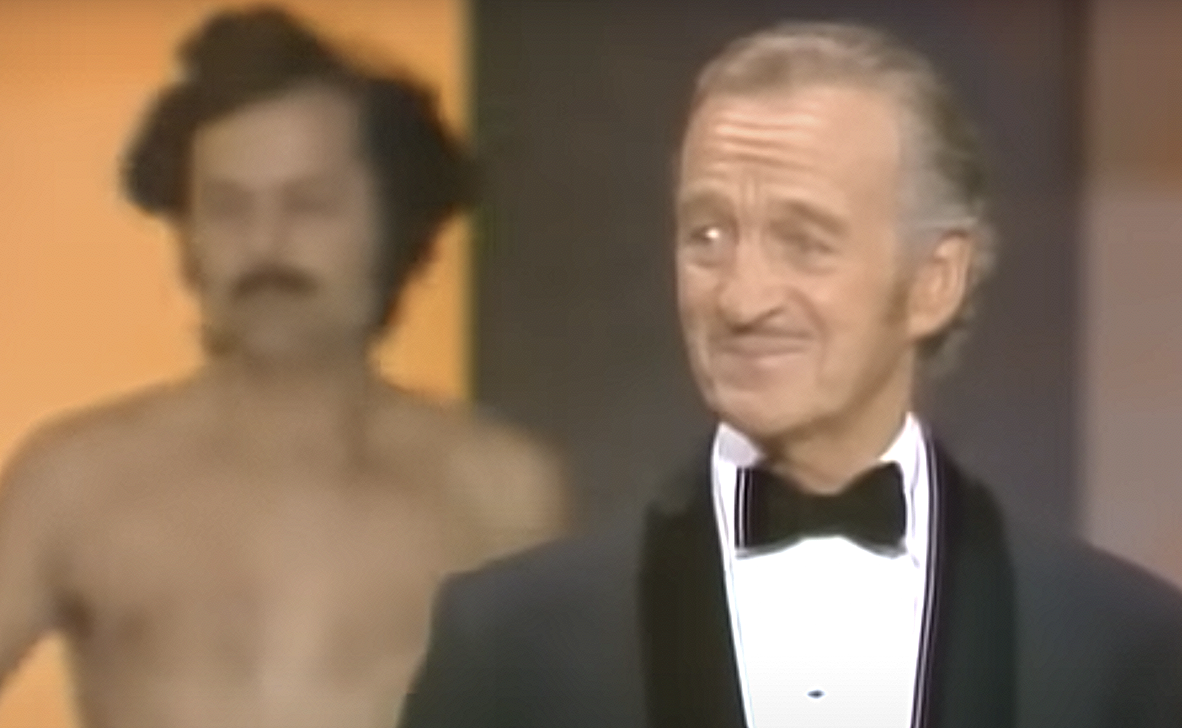John Cena‘s recent nude moment on the Oscar stage reminided me of something I’ve never mentioned and had almost forgotten about.
I’ve written before about having servied four days in L.A. County Jail, for the crime of having failed to pay 27 parking tickets. It happened sometime in the late spring or early summer of ’74, and it was during the initial processing (when they create your identity card, make you take a shower and give you the orange jumpsuit and your bedding) that I noticed that the Oscar streaker guy, Robert Opel, was also being processed.
Opel’s photo had been in the papers; he’d also been interviewed by local TV news shows so the recognition was instant. Did I go over and strike up a conversation? Nope — wimped out. But it was him, all right.
Opel was born in 1939 in East Orange, New Jersey. After graduating from a Pittsburgh-area college he allegedly worked as a speechwriter for California Governor Ronald Reagan.
Opel was teaching for the Los Angeles Unified School District at the time of the Oscar streaking incident, and was canned because of that.
Opel was mostly gay with a little bi action on the side. After moving from L.A. to San Francisco during the mid ’70s, he opened Fey-Way Studios, a gallery of gay male art, at 1287 Howard Street. The gallery helped bring such erotic gay artists as Tom of Finland and Robert Mapplethorpe to national attention. But in the mid ’79 he was in a relationship with Camille O’Grady.
At age 39 Opel was shot to death at his San Francisco studio — it happened on July 7, 1979. His killer was Maurice Keenan, a thief who is still doing time for the crime.
There’s a documentary about Opel on YouTube. It’s called Uncle Bob, directed by Opel’s nephew and namesake.HE Plus, 6.29.19: There’s a great Charles Bukowski line from one of his short story volumes, a line about how good it feels and how beautiful the world seems when you get out of jail.
I can personally confirm that. Not only does the world look and feel like the friendliest and gentlest place you could possibly experience, but it smells wonderful — food stands, car exhaust, sea air, asphalt, window cleaner, green lawns, garbage dumpsters. Compared to the well-scrubbed but nonetheless stinky aroma of the L.A. County Jail, I mean.
I did three or four days in L.A. County in the ’70s for unpaid parking tickets. Remember that Cary Grant line in North by Northwest about the cops chasing him for “seven parking tickets”? Well, I went to jail for not paying the fines on 27 of the damn things. That’s right — 27. I had a half-arrogant, half-cavalier attitude back then, to put it mildly. I didn’t agree with the idea of forking over hundreds in parking fines. The money they wanted was excessive, I felt, especially after the penalties increased after I didn’t pay in the first place.
One night after 9 pm I was driving west on Wilshire Boulevard, not too far from Bundy. I was pulled over for running a red light. They ran my plates and I was promptly cuffed and taken down to the West Los Angeles police station on Butler Avenue.
The desk cops discovered my multiple offenses after doing a search, of course, They printed out copies of each arrest warrant for each “failure to pay fine.” I remember some laughter as the printer kept printing and printing and printing.
I was taken down to L.A. County later that night. It was just like what Dustin Hoffman went through in Straight Time. A shower, orange fatigues, bedding. I was put into a cell with three other guys. Being in close proximity to bald naked winos who smelled horrible…memories!
Over the next three or four days I was driven around to the various municipalities where I’d failed to put quarters into the meter — Santa Monica, Van Nuys, Malibu, Central Los Angeles. In each courtroom I was brought before a judge, listened to my offenses, pled “guilty, your honor” and was given a sentence of “time served.” I was released at the end of the fourth day.
It was an awful thing to go through, but I managed to eliminate a total debt of at least $2K (it might have closer to $2500) so when I got out I didn’t owe a thing to anyone. So in a sense I earned or was “paid” at least $500 a day.
I know enough about mingling with other lawbreakers to recognize the truth of a line that Hoffman’s Max Denbo said in Straight Time: “Outside it’s what you have in your pockets — inside it’s who you are.”
I remember spending several hours in a common-area holding cell with nine or ten guys. One flamboyantly gay guy was jabbering with everyone and discussing his life and values and colorful adventures. He talked a lot about how much he loved hitting his favorite bars in “Glitterwood” (i.e., West Hollywood). At one point he came over to me and flirted a bit…sorry.
There’s nothing like getting out of jail to make you feel like Jesus’ son. It reminds you what a wonderful and blessed place the world outside is, and what a sublime thing it can be to walk around free and do whatever you want within the usual boundaries, and how serene it can be to be smiled at by strangers in stores and restaurants. People you wouldn’t give a second thought to suddenly seem like good samaritans because of some act of casual kindness.
Jail doesn’t just teach you about yourself but about your immediate circle. “If you want to know who your friends are,” Bukowski once wrote, “get yourself a jail sentence.” Or do some time in a hospital bed.

